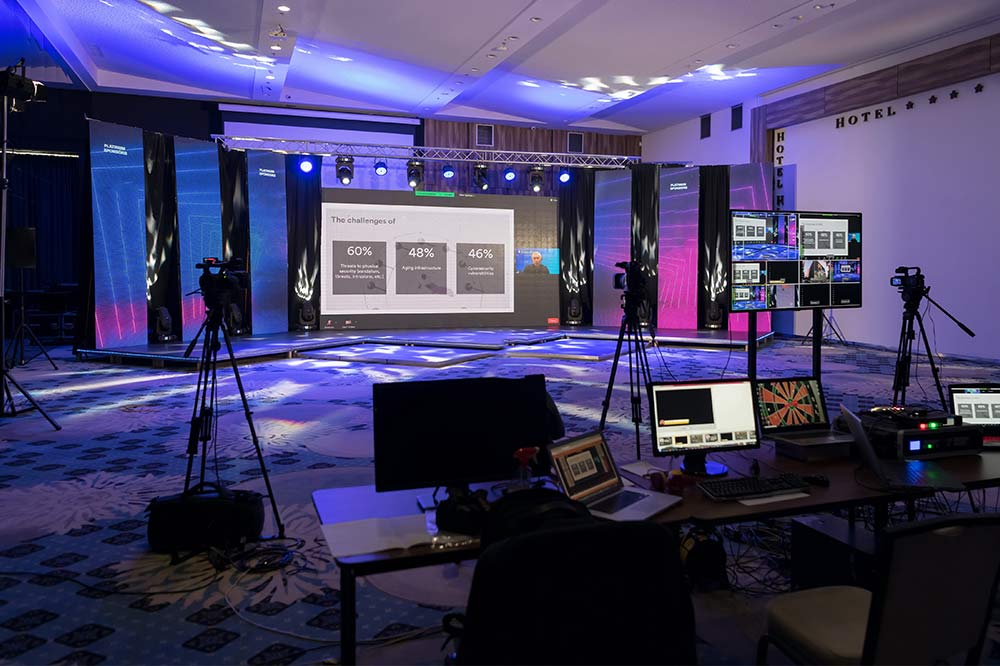Conferences are ubiquitous in most industries. There is something to be said for paying hundreds of dollars in travel and accommodation, showing up at a venue before the sun rises, and sitting in a stuffy conference centre for hours on end.
To be honest, in-person events and conferences can be a really great way to distribute content and network, but are they the most effective way to build and connect with an audience?
As businesses and governments look to tackle climate change, there has been a renewed focus in digital alternatives to events, namely virtual events (not to mention the increased interest coming from businesses as they try to manage the fallout from coronavirus event cancellations).
With all this in mind, the question remains: what is better, in-person or virtual events?
But first, let’s get back to basics...
What is a Virtual Event?
Before we can answer that question, it helps to understand exactly what we’re talking about when we refer to virtual events.
A virtual event is a large, multi-session online event that often features webinars and webcasts. The most basic definition of a virtual event is: an online event that involves people interacting in a virtual environment, rather than a physical location. They are great because they are highly interactive and give a similar look and feel to a physical event.
Types of Virtual Events
Okay, now that we know what a virtual event is, we can take a look at the different types of virtual events. Yes, there are a number of different types of virtual events - most of which are tailored to specific goals or purposes.
Virtual Open Days
Virtual Open Days are the virtual alternative to traditional physical colleges or university open houses. Choosing a college or university to attend is a life-changing - and often daunting - decision, and Virtual Open Days give prospective students the freedom and flexibility to learn more about potential academic institutions, so they can make a more informed decision.
Virtual Conferences
Similar to conventional conferences, virtual conferences are highly engaging and include a series of large sessions run by thought leaders in the industry who present to and interact with attendees. Virtual conferences achieve this by hosting a virtual lobby wherein attendees can choose sessions and streams to “attend.” And, like conventional conferences, virtual conferences offer the opportunity for sponsorship, sell tickets to engage with speakers through polls, chats, and live Q&As.
Virtual Career Fairs
A virtual career fair, or online job fair, is a virtual event that allows employers to connect with job seekers in a virtual environment, rather than a physical one. Virtual career fairs are transforming the way job seekers and potential employers interact. Just like with other types of virtual events, interactive features such as webinars, webcasts, live chat, chat rooms and more, break down geographical barriers and extend the reach of potential employers without losing the valuable engagement that attracts prospects.
Virtual Trade Show
Virtual trade shows are considered the online equivalent of traditional trade shows, but unlike their physical counterparts, virtual trade shows are not limited by their geographical location. Just like with traditional trade shows, attendees interact with hosts and sponsors, getting access to loads of valuable content. And, they can attend virtual trade shows anywhere, anytime - all that’s needed to attend is a computer or mobile device with a good internet connection.
Virtual Benefits Fairs
A virtual benefits fair is an event designed to help employers and benefits providers communicate and explain the benefits provided to their employees at scale through an interactive online environment, rather than a physical one.
Only 40% of employers help employees understand and maximize their work benefits, so virtual benefits fairs make providing this information to employees more affordable and scalable by removing the physical and time-based barriers that often come with in-person events. This can be especially useful for Enterprise organisations with multiple locations. These benefits fairs result in more informed employees who benefit from understanding the entire scope of their compensation package, rather than just their salaries.
→ Want to run your event online? Get a quote now.
Pros of Hosting Your Event Online
Now that we know what a virtual event is and what types of events there are, we can really start to explore the benefits of this type of event (and there are heaps of them!).
- Flexible: What’s great about virtual events is that they’re flexible and can be tailored to your business needs. If you can think of an event you can host in-person, the odds are that you can host it virtually, you just need to ensure you have the right platform and tools at your disposal.
- Cost-effective: Venue hire can run in the tens of thousands of dollars just for one day, and that doesn’t even take into account the cost of food and drink, accommodation for speakers, and venue insurance. With virtual events, those costs are non-existent. All you have to pay for is the platform, promotion, and speakers (depending on your business model).
- Scalable: Most physical venues have a limit to the number of people allowed in, and then you have to take into account the cost of hosting thousands of people. Virtual events make it much easier to scale, meaning you can host more people for a fraction of the cost (WorkCast, for example, can host up to 50,000 attendees per event). This also means you can expand your reach and promote brand awareness.
- Engaging: 30% of people are more likely to speak to a person in a virtual booth. Maybe that’s because people are scared to approach someone at an event or they just enjoy the anonymity. Either way, virtual events offer tools such as polls, Q&A, live chat, and even a downloadable resources section so your attendees can fully engage with your content. Also, some platforms offer the ability to integrate with widgets, such as sli.do, so you can really ramp up the interaction.
- Environmentally friendly: The costs of hosting an in-person event aren’t just monetary, they can be environmental. U.S. residents made 463.6 million person‐trips for business purposes in 2018, with 38% for meetings and events. That’s more than 175 million trips to meetings and events alone. Virtual events take away the need for people to travel hundreds of miles to venues, and instead allow them to access your event from much closer to home, not only saving businesses money, but reducing the impact on the environment.
- Reliable: Virtual events are nothing if not resilient. There is no need to cancel a virtual event because of weather or even a global pandemic (looking at you here coronavirus). Because attendees can view the event from anywhere, it means that factors that would cripple a physical event aren’t even a consideration.
- Provide comprehensive analytics and reporting data: Want to know how many people viewed an entire presentation? Or, want to find out how many questions were asked? These are hard stats to pull from in-person sessions, but are at your finger-tips with online events. Why is this important? Knowing your viewing stats or engagement scores can really help you fine tune your content and determine what’s working and what’s not without having to rely on a post-event survey that only 10% of attendees will actually respond to.
Cons of Virtual Events
While virtual events are a great alternative to physical events, there are some cons to be aware of when considering them as an option.
- Lack of networking opportunities: While there are heaps of opportunities for attendees to engage with speakers and content, there are fewer to interact with one another. You can mitigate this with live attendee chat and social networking events, but there aren’t really any ways to interact with other attendees offline.
- Distractions: Let’s be honest, offices are full of distractions. For example, as I am writing this blog I am getting IMd and can see that I have a gazillion emails in my inbox. Attendees at a virtual event will have to contend with distractions that aren’t necessarily there in-person, which is why we always recommend attendees and presenters try to find a quiet place to attend the online event
- No getting away from the office: Otherwise known as a business vacation, attending an event can be an opportunity for people to get out of the office, making them very enthusiastic about participating in conference and event activities.
- Can limit audience: I’m not talking about audience number, but rather types of audience. If your prospective attendees aren’t all that internet savvy, a virtual event may turn them off, so it’s important to provide potential attendees with links to any FAQs or contact details for event support prior to the event.
How to Host a Virtual Event
If you do decide to host a virtual event, you’ll need to this out carefully. Follow these simple steps:
- Decide on the type of event you want to host: Are you looking at running a large multi-session virtual event or will a single session webinar or webcast do? The type of event you want to run will inform your platform needs.
- Choose a platform: Not all online event platforms are created equally, and not all will have the ability to host the type of event you want to run, so make sure you know exactly what functionality and support your platform provider offers.
- Decide whether it will be free to attend or requires tickets: Virtual events are similar to physical ones in that you can gate them and charge people to attend. IF you do decide on a paid model, ensure you platform can accommodate this.
- Choose your event environment: You’ll likely have to work closely with your platform provider on this. You will need to decide what type of branding you want, if you need room for sponsorship branding, and what types of sessions will be on offer.
- Choose your speakers: You don’t need this information immediately but, as with physical events, speakers can be a big draw, so determining who your speakers are and putting their information on your promotional material (including on your reg page)
- Decide on your date and time: Keep in mind factors such as audience and speaker availability (though pre-recording and simulive can help on this end).
- Promote your webinar: Just as with in-person event, having a multi-channel promotion strategy will ensure the success of your event i.e. social media, email marketing, landing pages and website banners
- Create engaging content to captivate your audience: This can either be done by your events/marketing team for smaller events, or by your speakers in more traditional conference layouts. Just make sure you have your content at least a few days ahead of time, so you have time to upload it and rehearse.
- Practice, practice, practice: Speaking of rehearsal, it’s important to ensure you know your content (or your speakers do). Scheduling in dry runs means that there won’t be any surprises on the day and your audience will get an awesome experience.
- Follow up with your audience: After the event, reach out to your audience - whether it’s with a post-event survey, a link to recorded content, or even an early-bid invite to your next event. It’s important to keep them engaged even after your event is finished.
WorkCast Top Tip: We offer a comprehensive virtual event project management support service. Get your own dedicated virtual event planner and take the hard work out of virtual events.
Virtual Event Ideas
Need some help coming up with some ideas for virtual events? Here are some examples to get you started:
South by Southwest (SXSW): SXSW is an annual conference/festival featuring film, interactive media, and music events that takes place annually in Austin, Texas. What’s great about SXSW is event organizers stream the keynote speeches online for all to see and enjoy, increasing their accessibility and opening up content to those who can’t get down to Texas.
Idea: Stream panel discussions to extend the reach of physical events you’re already hosting.
AWSome Day Online Conference: This is Amazon event showcases the AWS platform and its core capabilities. It’s free and looks to engage IT managers, system engineers, system administrators, developers, architects, and business leaders, with content will be available in English, French, Spanish, Italian and German.
Idea: Include free training or certification as part of your online conference to increase the ROI for attendees.
Graduate Prospects UK Virtual Career Fair: Prospects has worked at the heart of the higher education sector for almost 50 years and is the only careers organisation to invest its profits back into education. In June 2019, they started running virtual careers fairs for graduates to increase their prospects after graduation. Their first event garnered over 2500 registrants and had multiple sessions with recruiters.
Idea: Use multiple sessions to create streams for attendees, meaning they can focus on the content that most interests them.
CBI Annual Conference: CBI is one of the UK’s premier business organisations, directly influencing over 7 million professionals. Their annual conference is their flagship event, with guest speakers previously including the Prime Minister, the Leader of the Opposition and many other leading business speakers. Each year, they replicate their annual conference with a live conference stream, extending their reach to audiences attending out in the regions and internationally.
Idea: Gate exclusive events with pay-to-attend model. This way you can increase accessibility while also generating revenue.
As you can see, virtual events are an engaging, flexible, and highly resilient way to run your events. Whether you replace your physical event completely or supplement it with digital content, taking your conferences, trade shows, and careers fairs online can increase your reach, minimize your costs, and delight your audience.
Seem like a lot to take in? We offer full virtual event planning as standard with our packages so you can produce and run the best events you ever will.
Learn more about WorkCast's Virtual Event Planning.
Learn How To Create A Virtual Event On A Budget in our free webinar.
Share this
You May Also Like
These Related Stories

The Best Webinars, Webcasts and Virtual Events of 2019

When Does a Webinar Become a Virtual Event?



